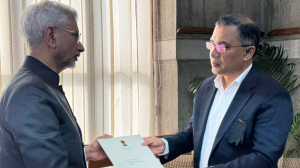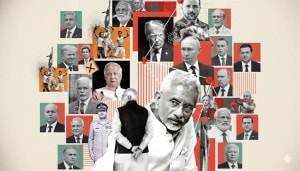Logic v politics
He had stopped over briefly in Prague for a handshake with Russias president,Dmitry Medvedev,on a new strategic arms-reduction treaty...
He had stopped over briefly in Prague for a handshake with Russias president,Dmitry Medvedev,on a new strategic arms-reduction treaty and a new start also,it is hoped,in relations with Americas still prickly cold-war rival. And then Barack Obama was due back in Washington to play host to more than 40 heads of government for his own nuclear-security summit on April 12th and 13th. Mr Obama wants pledges from them to secure nuclear materials around the world and to crack down harder on illicit traffickers,ahead of next months five-yearly review of the Nuclear Non-Proliferation Treaty,the worlds main bulwark against proliferation and nuclear terrorism.
Yet when it comes to recasting Americas own nuclear-weapons policy to deal more efficiently with the same threats,Mr Obama may have a battle ahead. In many ways,this weeks delayed nuclear posture review simply brings Americas official nuclear thinking into line with long-standing practice,including that of his more warlike predecessor,George Bush. With the demise of the old Soviet threat,nuclear weapons play a diminishing role in Americas defences. Like Mr Bush,Mr Obama plans instead to rely more on Americas array of powerful conventional weapons to deter future adversaries in a crisis.
But Mr Obama has followed this logic several steps further. He did not,as some inside and outside his administration wanted,declare that America would never be the first to use its nuclear weapons. That would have unsettled allies in exposed places who still rely for their safety on Americas nuclear umbrella.
Instead the review repeats a past pledge that America will not use nuclear weapons against states that do not have them and are in compliance,Mr Obama says,with their commitments under the Nuclear Non-Proliferation Treaty. That leaves Iran,Syria and others suspected of illicit nuclear dabbling still theoretically on the potential target list. Yet Mr Obama has also ruled out,as Mr Bush never did,nuclear retaliation against chemical,biological or cyber attacks by the nuclear have-nots unless,that is,Americas fundamental security or that of its allies is at risk.
He agrees with Mr Bush that America can make deep cuts in the weapons stocks it keeps in reserve to hedge against technical failure or a surprise new threat. Mr Bush would have done this while building fewer,but more modern,replacement nuclear warheads. Mr Obama prefers instead to refurbish some existing ones. He also plans to upgrade further Americas nuclear-weapons labs and other facilities. The vice-president,Joseph Biden,has called the labs national treasures. Mr Obamas budget includes 624m beyond the sum Congress earmarked last year for such work,with more to come over five years.
But already there are grumbles. The extra cash has not stopped the labs directors asking for more. Mr Obama needs their support. For he intends to do something Mr Bush refused to do: to work to win Senate ratification of the Comprehensive Test-Ban Treaty CTBT,which was rejected on a partisan vote in 1999.
The leader of the attack last time was Arizonas Jon Kyl,still a Republican senator. Mr Kyl insists,as he did then,that a CTBT is unverifiable and,by banning future testing,puts Americas nuclear safety and security at risk. In fact,America has not felt any need to test its bombs since 1992. Advances in high-speed computing and other technologies allow todays labs to solve problems that actual weapons tests never could. Meanwhile,the treatys global monitoring system is now a reality. Unlike other enemies,however,Mr Kyl is undeterred.
- 01
- 02
- 03
- 04
- 05































